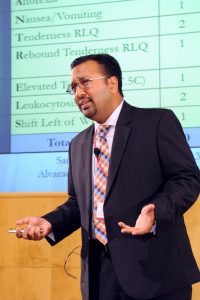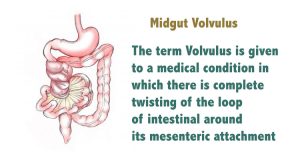Diagnosing serious abdominal emergencies in children and distinguishing them from a more benign complaint was the subject of the latest Grand Rounds lecture at Weill Cornell Medicine – Qatar (WCM-Q).

The talk was delivered by Dr Dewesh Agrawal, Professor of Paediatrics and Emergency Medicine at George Washington University School of Medicine, and Director of the Paediatric Residency Programme at the Children’s National Medical Centre in Washington, DC.
Addressing an audience of medical students, faculty members and other healthcare professionals, Dr Agrawal said many children who are suffering from abdominal complaints, particularly very young children, often appear before doctors with very vague symptoms.
Most children with true abdominal surgical emergencies often exhibit non-specific signs like vomiting, fussiness, or abdominal pain. Our job is to work out which one has something more serious than constipation or gastroenteritis.’
Dr Agrawal also explained how to diagnose appendicitis in a toddler. He reviewed the diagnosis and management of other abdominal surgical emergencies, including malrotation, presented with midgut volvulus, intussusception, and infantile pyloric stenosis.

During his three-day visit to Qatar, Dr Agrawal also toured the medical and educational facilities in the country, gave a number of presentations and met with senior medical executives and medical students. He spent his first day meeting with students and faculty of WCM-Q, and giving presentations to faculty and students on giving effective feedback to medical trainees. He also viewed the research presentations of WCM-Q students.
On his second day, he toured the HMC Paediatric Emergency Centre in Al Saad and the Al Wakra Hospital, where he met the Head of Paediatrics, Dr Khalil Salameh. He toured the hospital’s ER, nursery, and inpatient departments.
On the third day, he visited Sidra, and joined the clinical activities at the hospital. He also met with Dr Ibrahim Janahi and Dr Khalid Al Ansari. He presented a talk on evidence-based medicine biostatistics to paediatric resident doctors.
It was such a joy to visit Doha through the WCM-Q visiting professorship programme. I was extremely impressed not only by the quality of the curriculum and facilities, but also by the quality of trainees – both medical students and residents – and faculty. I sincerely hope that the trainees benefitted from my interactions with them, for the highest achievements of our careers in academic medicine are the people we train.’
WCM-Q Associate Professor of Paediatrics Dr Amal Khidir, who hosted Dr Agrawal’s visit, said that it was with great pleasure that they welcome such a highly regarded healthcare professional to Qatar.
We are sure that Dr Agrawal gained great insight into healthcare in the Gulf region from his visit, and we all benefited from his experience and the astute observations he shared with us.’
The Grand Rounds series is accredited locally by the Qatar Council for Healthcare Practitioners-Accreditation Department (QCHP-AD) and internationally by the Accreditation Council for Continuing Medical Education (ACCME).
For updates and more information, visit the WCM-Q website at qatar-weill.cornell.edu.










